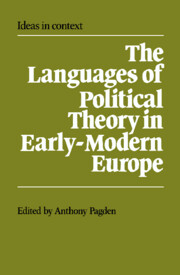Book contents
- Frontmatter
- Contents
- Notes on contributors
- Acknowledgements
- Introduction
- 1 The concept of a language and the métier d'historien: some considerations on practice
- PART I
- PART II
- PART III
- PART IV
- 13 The criticism of rhetorical historiography and the ideal of scientific method: history, nature and science in the political language of Thomas Hobbes
- 14 Saint-Simon and the passage from political to social science
- 15 Alexander Hamilton and the language of political science
- Index
- Ideas in Context
15 - Alexander Hamilton and the language of political science
Published online by Cambridge University Press: 04 September 2009
- Frontmatter
- Contents
- Notes on contributors
- Acknowledgements
- Introduction
- 1 The concept of a language and the métier d'historien: some considerations on practice
- PART I
- PART II
- PART III
- PART IV
- 13 The criticism of rhetorical historiography and the ideal of scientific method: history, nature and science in the political language of Thomas Hobbes
- 14 Saint-Simon and the passage from political to social science
- 15 Alexander Hamilton and the language of political science
- Index
- Ideas in Context
Summary
‘These calculations cannot absolutely be relied on because the data are necessarily uncertain; but they are the result of the best information I can obtain.’ So wrote Alexander Hamilton to his friend Robert Morris in 1782 about New York's balance of trade with the other states. At the very least we would recognise this as the letter of a very fact-minded man with a strong sense of the difference between social knowledge and good guessing. Given their contemporary resonance, we might even claim that Hamilton's words are still our own. And, indeed, if by vocabulary we mean just words or general expressions, then the continuity of the language of social science would be established by sentences such as this one. However, even if we mean to think of vocabularies that endure more comprehensively, as reminders of the extraordinary capacity of intellectual and moral dispositions to survive intact under the assaults of social change, we would find a significant example of such longevity here. One ought not to claim too much or too little, in this case. Hamilton was in many ways an oddity among the Americans of his time. Some of this ideas were a ‘gigantic irrelevancy’ for many of them. He was isolated in many ways, especially in his preference for a strong central government. It would therefore be absurd to treat his voice as representative of an age.
- Type
- Chapter
- Information
- The Languages of Political Theory in Early-Modern Europe , pp. 339 - 355Publisher: Cambridge University PressPrint publication year: 1987



